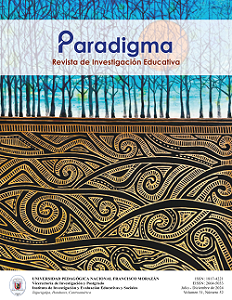Analysis of the Professional Competencies of Music Program Graduates from UNAH, 1988–2021
DOI:
https://doi.org/10.5377/paradigma.v31i52.19496Keywords:
professional competencies, music graduates, UNAH, curriculum planAbstract
This study aims to analyze the professional competencies of graduates from the Music Program at the National Autonomous University of Honduras (UNAH), from the inception of the program in 1988 to 2021, in relation to the curriculum, the labor market, and its social relevance. The research used a qualitative approach and a convenience sampling method. The study population consisted of 42 individuals: 30 employers, 10 administrative staff from the Department of Arts and the Music Program, and 2 curriculum specialists. The sample included 13 individuals: 10 employers of graduates, 2 from the administrative area, and one curriculum specialist with training in music. Semi-structured interviews were conducted with the participants, and a critical analysis of the curriculum was performed. The results showed that graduates demonstrate strengths in specific competencies such as musical sight-reading, harmony, instrumentation, and music theory. However, they also exhibit weaknesses in generic competencies such as planning, cultural management, research, and entrepreneurship. Additionally, a lack of training in areas demanded by the labor market, such as vocal performance and jazz, was observed. The study concludes that it is urgent to update the curriculum with a competency-based approach.
Downloads
206
Downloads
Published
How to Cite
Issue
Section
License
Copyright (c) 2024 Universidad Pedagógica Nacional Francisco Morazán

This work is licensed under a Creative Commons Attribution-NonCommercial-NoDerivatives 4.0 International License.
Transfer of Copyright
- The author, when sending the work, states that it is his will to give the Universidad Pedagógica Nacional Francisco Morazán the patrimonial rights that correspond to him as the author of his work.
- The rights here assigned include all economic rights (Reproduction, transformation, public communication and distribution) and are given without limitation in terms of territory; This Assignment is given for the entire duration term established in the current legislation in Honduras.
- The cession of the aforementioned rights does not imply the cession of moral rights over it, because in accordance with the provisions of the Copyright and Related Rights Law, Chapter II, of the Moral Rights, Article 34, Article 25 , these rights are inalienable, imprescriptible, indefeasible and inalienable.
- The research work or document must be original and have been done without violating or usurping rights of third parties, therefore, the work is exclusively authored and owns the same.
- In the case of any claim or action by a third party, as to copyright on the work in question, the author must assume full responsibility for the rights assigned.
- Upon completion of the Rights Assignment Form, the author states that the work has not been published in another way, that the rights on the work have not been assigned and that no encumbrance or limitation on their use or use is imposed on them.





